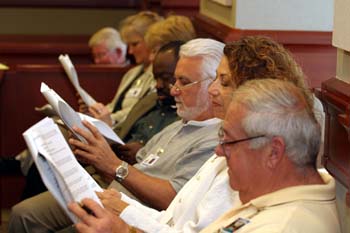
Participants from Volusia County, FL, Citizens Academy simulate a mock court session; (Photo credit: Jeff Crumbley, Staff Photographer, Volusia County Government)
While most programs are free for residents, some communities charge a nominal fee of each participant. These fees hover around $25 and are seen in cities and counties like Addison, TX, Boynton Beach, FL, Greenville, NC, Pitt County, NC, and New Hanover County, NC.
The rationale behind charging fees is that if participants are required to invest their own money, consistent participation for the entire program will be more likely.
Budgets
Most programs do not usually have their own line-item in a budget; a portion of the public information or city/county manager’s budget is often set aside for this purpose. Not counting staff time (which is almost always donated), most programs spend between $1,000-2,000. The higher end of budgets float between $5,000-6,000 and include: Nash County, NC, Winston-Salem, NC, and Durham, NC (split evenly between city and county governments). On the lower end, Fayetteville, NC, Newton, NC, Moore County, NC, Coral Springs, FL, and Windsor, CT, have all been able to keep costs under $400.
Expenses
Most of the money budgeted for citizens academies is spent on the following:
- Food (catered dinners, snacks, refreshments, and graduation receptions),
- Transportation (chartered buses or vans for facility tours), and
- Participant gifts (paperweights, polo shirts, class photos, etc.).
Nearly all organizations assemble a packet of information for participants, including agendas, contact sheets, department information, etc., which is often printed in-house at little cost. Some programs instruct presenting departments to organize their own dinners (e.g. a firehouse chili) if the larger program does not provide a regular lunch or dinner.
Cost-Cutting Measures
Some programs are funded partially or completely on external sponsorships. Two Rivers, WI, Fresno, CA, and Chatham County, NC, all rely on partnerships or donors to help cover program costs. Chula Vista, CA, only offers their program if 100% external sponsorship has been secured.
While several programs have been discontinued in recent years due to city and county budget cuts, some organizations have found ways to keep their citizens academy afloat despite new realities.
In 2009, Morrisville, NC, was able to reduce its program budget from $2,000 to $1,000 by eliminating food costs in a creative way: the program was rescheduled for a single weekend in April (all day Saturday, half day Sunday). This resulted in only needing food for three meals (Saturday light breakfast and lunch, Sunday light breakfast) instead of the usual nightly dinner over eight Thursday nights.
Statesville, NC, was able to fix its program budget at $700 by using the city’s recreation vans instead of chartered buses for city facility tours.
Concord, NC, maintains a budget of only about $400 that is mainly spent on a catered graduation dinner. Presenting departments are responsible for snacks at each session.
Buffalo, NY, a larger city, keeps its budget at $1,000 by soliciting food donations. Likewise, many cities are able to support local businesses by selecting them as caterers, which, over the years, has provided discounts for many cities and counties.
Finally, many cities and counties have eliminated ‘extra’ giveaways such as polo shirts, paperweights, and engraved pens (Lynchburg, VA, Volusia County, FL, and Fayetteville, NC). Instead, departments have opted to give away small tokens or items they have on hand such as pens, lapel pins, and padfolios.
Sample Cost Schedule
The file below is an example of a program cost worksheet, developed by the NCCCMA.

